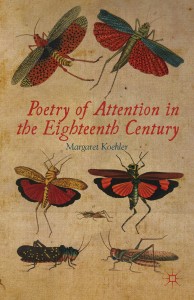Koehler ’95 Studies 18th-Century Poetry, Links to Cognitive Psychology

In her academic study Poetry of Attention in the Eighteenth Century (Palgrave Macmillan), Margaret Koehler ’95 identifies a pervasive cultivation of attention in 18th-century poetry. The book argues that a plea from a 1692 ode by William Congreve—’Let me be all, but my attention, dead’—embodies a wider aspiration in the period’s poetry to explore overt themes of attention and demonstrate techniques of readerly attention. It historicizes 18th century accounts of attention and pioneers a link between the period’s poetry and recent discussions of attention in cognitive psychology.

Koehler’s book contributes to the largely neglected history of a psychological trait that has assumed a recent cultural urgency, and it repositions 18th-century poems as a collective model for assiduous reading and supple, wide-ranging attention.
In her introduction, Koehler writes: “By identifying attention as a central theme and task of 18th-century poetry, this book attempts to locate both greater coherence and greater variety among the period’s poems. I aim to outline common themes and methods that connect seemingly dissimilar poems: odes from different phases in the period, sudden shifts of focus that connect mock-heroic to landscape poetry, sensory experiments across the period.”
Koehler is an associate professor of English at Otterbein University in Westerville, Ohio. She has published essays in Modern Philology, Studies in English Literature, and Blackwell’s A Companion to Eighteenth Century Poetry.

